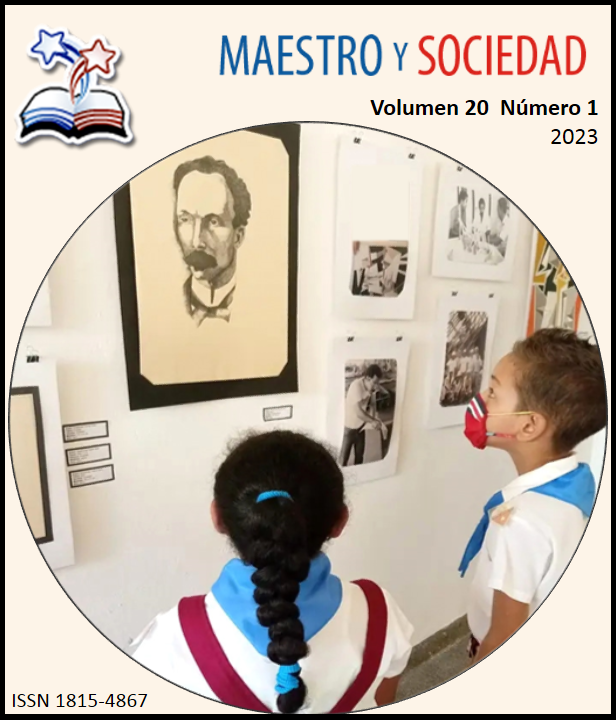Reading comprehension and critical thinking in high school students in Huaraz, Peru
Reading comprehension and critical thinking in high school students in Huaraz, Peru
Keywords:
reading comprehension, critical thinking, students, high schoolAbstract
Introduction: The purpose of this study was to determine the presence of reading comprehension in critical thinking in high school students.
Materials and methods: The methodology had a non-experimental and descriptive design with a sample of 217 students between women and men, who belong to the second grade of the secondary level.
Results: A reading comprehension test was applied, with 20 questions that address three dimensions of reading comprehension and four dimensions of critical thinking, it was evaluated by means of calculation tables for reading comprehension prior to the beginning, process and satisfactory and for thought. critical, low, medium, good, with 20 questions. The results indicate that in reading comprehension the majority is in process with 51.2% and in critical thinking the good level with 35.0%.
Discussion: The greater the reading comprehension, the greater the critical thinking in the students, however, this does not happen by itself, but teachers must be prepared to innovate education to promote relevant learning.
Conclusions: Students have a greater presence of reading comprehension at the beginning and in the process.
References
Atúncar-Prieto, C., Deroncele-Acosta, A. (2021). Educational virtualization model in initial teacher training. Proceedings - 2021 16th Latin American Conference on Learning Technologies, LACLO 2021, pp. 490-493. https://ieeexplore.ieee.org/document/9725165
Boisvert, J. (2004). La formación del pensamiento crítico: teoría y práctica. Fondo de Cultura Económica.
Calvo Núñez, M.C. (2021). Niveles de comprensión lectora y el pensamiento crítico de los estudiantes del primer y segundo año de la escuela de primaria de la facultad de educación de la Universidad Nacional Federico Villarreal, Lima – 2017. https://bit.ly/3ZR9kt
Cassany, D., Luna, M., Sanz, G. (1998). Enseñar lengua. Editorial GRAO Educación.
Chair, C. (2002). Reading for Understanding Toward an R&D Program in Reading Comprehension. Dffice of Educational Research and Improvement (DERI). https://apps.dtic.mil/sti/pdfs/ADA402712.pdf.
Colemer, T y Camps, A (1996). Enseñar a leer, enseñar a comprender. Celeste/ M.E.C.
Cornoldi, C. & Oakhill, J. (2009). Reading comprehension difficulties. Processes and intervention. Lawrence Erlbaum Associates. https://bit.ly/3J5mD3c
Deroncele-Acosta, A. (2022). Competencia epistémica: Rutas para investigar. Universidad Y Sociedad, 14(1), 102-118. https://rus.ucf.edu.cu/index.php/rus/article/view/2540
Deroncele-Acosta, A., Nagamine-Miyashiro, M., Medina-Coronado, D., Rivera-Portugal, A.M., Berroa-Garate, H.C., Flores-Llerena, D.Y., Huarca-Flores, P. (2021). E-learning for the development of critical thinking: A systematic literature review. Proceedings - 2021 16th Latin American Conference on Learning Technologies, LACLO 2021, pp. 173-180 https://ieeexplore.ieee.org/document/9725189
Deroncele-Acosta, A., Nagamine-Miyashiro, M., y Medina-Coronado, D. (2020). Bases epistemológicas y metodológicas para el abordaje del pensamiento crítico en la educación peruana. Revista Inclusiones, 7(Número Especial), 68-87. https://www.revistainclusiones.org/index.php/inclu/article/view/302
Deroncele-Acosta, A., Nagamine-Miyashiro, M., y Medina-Coronado, D. (2020). Desarrollo del pensamiento crítico. Revista Maestro y Sociedad, 17(3), 532-546. https://maestroysociedad.uo.edu.cu/index.php/MyS/article/view/5220
Franco Rolfes, D., & Deroncele Acosta, A. (2022). Estrategias adaptativas dinamizadoras del pensamiento crítico. Revista Conrado, 18(S4), 399-407. https://conrado.ucf.edu.cu/index.php/conrado/article/view/2828
Habib, M. (2016). Assessment of Reading Comprehension. Revista Românească pentru Educaţie Multidimensională. https://revistaromaneasca.ro/wp-content/uploads/2016/06/REV_june2016_125-147.pdf.
Kurfiss, JG. (1998). Critical Thinking: the, research, practice, andpossibilites, ASHE-ERIC.Hig her Educatión, 2(110). https://eric.ed.gov/?id=ED304041.
Leppänen, U., Aunola, K., Niemi, P. & Nurmi, J. (2008). Letter knowledge predicts Grade 4 reading fluency and reading comprehension. EL SEVIER. https://www.sciencedirect.com/science/article/abs/pii/S0959475207001375.
Lipman, M. (1987). Critical thinking: What can it be? Analytic Teaching, 8(1).
Minedu. (2002). Programa de Formación Continua de Docentes en Servicio Educación Secundaria –Comprensión lectora. Dinfocad/ucaad-dinesst/udcrees.
Minedu. (2006). Guía de estrategias metacognitivas para desarrollar la comprensión lectora. Minedu.
Mollo-Flores, M., Deroncele-Acosta, A. (2021). Meaningful Learning: towards a Meta-regulated Learning model in Hybrid Education. Proceedings - 2021 16th Latin American Conference on Learning Technologies, LACLO 2021, pp. 52-59. https://ieeexplore.ieee.org/document/9725146
Moreno, S (2019), Comprensión lectora y el pensamiento crítico en los estudiantes de secundaria de la Institución Educativa Santa Rosa de Viterbo, Huaraz-2018.
Palacios-Núñez, M. L., Toribio-López, A., & Deroncele-Acosta, A. (2021). Innovación educativa en el desarrollo de aprendizajes relevantes: una revisión sistemática de literatura. Universidad Y Sociedad, 13(5), 134-145. https://rus.ucf.edu.cu/index.php/rus/article/view/2219
Palacios-Núñez, M., Deroncele-Acosta, A., & Goñi Cruz, F. F. (2022). Aprendizaje colaborativo en línea: factores de éxito para su efectividad. Revista Conhecimento Online, 2, 158–179. https://doi.org/10.25112/rco.v2.2925
Paul, R., & Elder, L. (2003). Una mini-guía para el pensamiento crítico, conceptos y herramientas. https://www.criticalthinking.org/resources/PDF/SP-ConceptsandTools.pdf
Pinzas, J. (1997), Meta cognición y lectura. Universidad Católica del Perú.
Scriven, M., & Paul, R. (1987). Critical thinking. In The 8th Annual International Conference on Critical Thinking and Education Reform, 7(9). readercriticalthinking.doc (live.com).
Solé, I. (1999). Estrategias de lectura. Editorial GRAO Educación.
William, N. (1998). Teaching Vocabulary to Improve Reading Comprehension. International Reading Association, Newark, Del.; National Council of Teachers of English, Urbana, Ill. https://files.eric.ed.gov/fulltext/ED298471.pdf
Downloads
Published
How to Cite
Issue
Section
License
Copyright (c) 2023 Nancy Rosario Ramírez Rondan

This work is licensed under a Creative Commons Attribution-NonCommercial-NoDerivatives 4.0 International License.
This journal provides immediate open access to its content, based on the principle that offering the public free access to research helps a greater global exchange of knowledge. Each author is responsible for the content of each of their articles.



























 Universidad de Oriente
Universidad de Oriente 